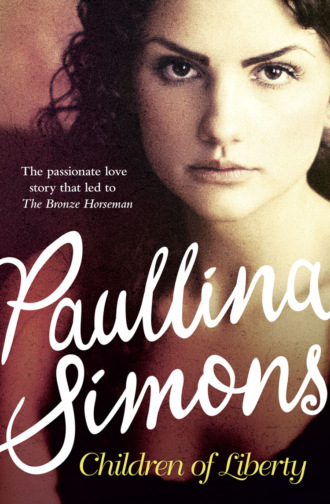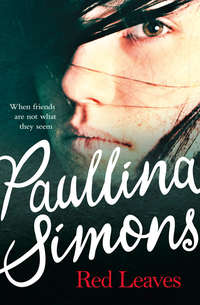
Полная версия
Children of Liberty
Gina nearly clapped. Thank God for her practical-minded mother. She knew Salvo would never relent; his pride was too great. She never understood that. Did that mean she had no pride? She didn’t think so. It just meant she wouldn’t let foolish pride stand in the way of what she really wanted. And what she really wanted was to see what the two young men were offering her family. “Pride is a peccato capitale, Salvo,” she whispered into his ear as they hurried to help their mother.
“Lust and sloth also, sister,” he retorted.
“Our carriage is waiting for you just there,” Ben said to Mimoo, solicitously taking her elbow and pointing to the far end of Freedom Docks, toward the city, where a number of other carriages stood arrayed, waiting for fares. “Will you be all right walking?”
Mimoo smiled at Ben. Salvo, who saw everything, muttered a bad word to the heavens. “Young man, I just traveled six thousand kilometers. Will I be all right walking a hundred meters? Let’s go. Let me take your arm.”
Gina walked behind Ben and Mimoo, pulling her own trunk, exorbitantly pleased. Salvo dragged the rest of the baggage. “Where did you learn to speak Italian, young man?” Mimoo asked Ben.
“Oh, just a word here and there to help us with our business. Most of the immigrants we greet are Italians.”
She appraised him approvingly. “Are you a good son to your mother?” she asked.
“I am a son,” Ben allowed.
“She must be proud of you.” She glanced back at Gina, walking next to Harry, and frowned. “You two are brothers?”
“In spirit,” Ben said, “In spirito santo.”
Salvo managed not only to drag the two largest trunks, but also to walk ahead of everyone else, as if he knew where he was going.
“Your brother is leading the way?” Harry quietly asked Gina with a shrug. “In the kingdom of the blind, the one-eyed man is king.”
Gina didn’t quite understand, but she couldn’t speak even teasingly against her brother to a stranger. Before she could think of something witty to say, Mimoo disengaged from Ben and motioned her to come. “Gia, come here. Walk with me. Let the men carry the heavy things.”
Gina hurried ahead, taking Mimoo’s elbow, freeing Ben to direct Salvo to the appropriate horse and carriage.
“Your mother is a wonderful woman,” Ben said to Salvo, stopping at a sickly gray mare.
Salvo eyed him with disdain. In Italian he said, “What you’re trying to get next to my mother too?”
Ben didn’t understand the words, but got the gist. With a tip of his hat, he stopped making nice to Salvo and untied the straps of the open wagon. The mare didn’t look like it would live through the ride with the trunks. It didn’t look like it would live through the heat of the evening.
After the baggage was loaded, Mimoo and Gina climbed up and sat in the open carriage facing the road, while Ben and Salvo perched on the bench opposite and Harry climbed into the driver’s seat, grabbing the reins. The pale horse lurched forward, its jerking motion nearly dislodging the carefully arranged and roped trunks on the rear rack. Ben admonished his friend to be more careful.
“I’ll try,” Harry said, “but you know it’s my first time at the reins.”
Ben calmed Mimoo down. “He is only joking. Harry, stop it, you are frightening our lovely passengers.” Even Mimoo smiled benevolently at being called bellissima. Salvo looked ready to punch him.
“Will this take long?”
“Not too long. But it’s dinner hour. The traffic will be heavy. We’re about a mile away. We’re headed to an area of Boston called the North End. Have you heard of it?”
“I haven’t, no,” Gina said. “Is it nice?”
“You’ll see.” Ben smiled at her. She smiled back. Salvo glared at her. She stopped smiling and stuck out her tongue at her brother.
“So what’s in Lawrence?”
“Our cousin Angela lives in Lawrence,” Salvo said, directing Ben’s attention to himself. “She is waiting for us. She thinks we are arriving today. We are going to live with her.”
“Is this Angela going to get you a job?” Ben asked.
“Are you?”
“Of course.” Ben looked across at Gina. “What do you like to do, Miss Attaviano?”
“Please call me Gina.” She smiled. “I like to swim.”
“Hmm. I don’t know if I can get you a job swimming,” he said. “Harry, what do you think?”
Harry said nothing, and Mimoo sat with her hat down over her heavy-lidded eyes, as if seeing nothing, hearing nothing. Suddenly she said to Gina in Italian, “Gia, think how wonderful—soon we will celebrate your birthday in our new country.”
“Yes, it’s good,” echoed Gina, puzzled at the sudden change of topic, and opened her mouth to continue talking to Ben about her other interests and hobbies, like running, planting flowers, making tomato paste, delicious crusty bread, occasionally singing.
Mimoo’s eyes opened slightly, to take in Ben across from them, to make sure he was listening. “We should do something special for your fifteenth birthday, no?” she said to her daughter. “Salvo, what do you think?”
“Do I look at this moment like I care, Mimoo?” said an exhausted yet watchful Salvo.
But you know who did look at that moment like he cared? Ben. For all his declarations about barely speaking Italian, he managed to understand the only important thing in Mimoo’s statement: the tender age of her only daughter. Gina was only quattordici!
His crestfallen face said everything. Above Ben’s head, Harry’s slim shoulders bobbed up and down as if he was laughing.
“Well, then, yes—um—excuse me for a moment,” Ben said, getting up suddenly. “My friend doesn’t know where he is headed. I must direct him.” He climbed up to sit next to Harry, grabbing the reins out of his mirthful hands.
Gina pulled the bonnet over her own eyes, to hide from the disappointment on the American’s downcast face. Mimoo was such a troublemaker. What was the harm anyway?
“I’ll tell you what the harm is,” Mimoo whispered semi-privately. “You’re too young for their attention. Do you hear me? This isn’t Belpasso, you running around barefoot in the dusty gulleys with children. These are American men. They’re probably older than your only living brother. You think this is what your father wanted for you, to get yourself in the family way at fourteen with men in their twenties? Troppo giovane!”
“Mimoo! Family way? We were just talking.”
“How do you think it all starts, o naive child? You think it goes straight to baby-making?”
“Mimoo!” hissed a mortified Gina. “I don’t want to talk about this with you.”
“Correct, this is not open for discussion. Stay far away.”
Pulling away from her mother, Gina leaned forward, to hear better what Ben and Harry were whispering about. But the city was too loud, the hooves on the stones were too tap-tappy, and Mimoo pulled her back, keeping her daughter close.
“I told you,” Harry was saying to Ben. “I warned you. As soon as I saw her from a distance, do you remember what I said to you?”
“Yes, yes. You said she was trouble. You were wrong then, and you’re wrong now.”
“Benjamin, I know about these things. She is trouble.”
“You know nothing except the idiocy you glean from your insipid books that tell you nothing about life. You don’t know how to live.”
“And you do?”
“Yes, I do. She is not trouble. She is Life!”
Harry rolled his eyes to the heavens. “More fool you. How else do you define trouble?”
“Like a femme fatale,” Ben said.
“Give her time, Benjamin. She is a fille fatale. Quattordici indeed!”
Ben moved away from a mocking Harry, his shoulders dropping.
Chapter Three
NORTH END
NORTH End was across a horsemeadow from Boston proper, rising out of the soot and the afternoon coal heat. It seemed slightly detached, as if separated from the rest of Boston by this natural boundary. You had to cross a manure-covered field before you entered Salem Street that stretched and wound past a tall church, past merchants on the streets hawking their wares, past the shops and the stalls. A trumpet band played loudly on another block; there was yelling from the children and shouting from the mothers. Men stood around in circles and smoked; the smell of the city was strong, the traffic—human, horse and tram—hectic, almost deranged. Everyone was moving one or another part of their bodies, their lips going a mile a minute, their legs carrying them who knew where, with their bags, their prams, their dreams and umbrellas.
It was love at first sight for Gina. Her mouth open, she gaped, forgetting the mother, the brother, even the sand-haired silent boy who eyed her at the Freedom Docks. She sat near Salvo, who for some unfathomable reason looked less enraptured. “Santa Madre di Dio,” he said. “This is awful.”
Gina blinked. “What? No—just the opposite, Salvo. Look at it!”
“Papa told me about Milan. He said it was like this.”
“Well, if Papa wanted us to go to Milan, that’s where we would’ve gone,” snapped Gina. “He wanted us to come to America, so here we are. Oh, it’s wonderful!”
“You’re crazy.” He got up to get away from her, to take his place by his mother’s side. “Mimoo, she likes this!”
“Leave her be, Salvo,” Mimoo said. “Your father would be happy to know she likes it.”
Reproved by his mother, Salvo scowled at Gina even more resentfully.
Gina didn’t care. Her gaze was turned to the city.
The hurdy-gurdy man with the barrel organ played “Santa Lucia” from Gina’s native land. She was surprised she could hear it over the clomping and braying of the horses, the screeching from the electric trolleys she’d heard her father talk about, but never seen, the rush-hour swarms of people, the vendors yelling in Italian selling garlic and tobacco, the ringing of the church bells on the corner of Salem and Prince, perhaps announcing it was six o’clock and time for Mass. The trolleys didn’t move, the horses barely—the congestion was intense, and Gina feared any moment a fight would break out because people stood so close to each other, while the horses did their business right on the cobbled street which businessmen in shined shoes crossed to get home. Italian signs over the shops were everywhere, the boy on the corner proclaiming that he had the Evening Post, and the paper was Italian also. Everything smelled not just of manure and garlic but also of sour fermented wine.
It was the greatest place Gina had ever seen. She was smitten with it, bowled over. With her mouth open in happiness, she gulped the air as their dying steed moved forward a foot a minute. She had time to dream about the goat cheese and the sausages swinging from the hooks outside the storefronts. Another boy with a cart was selling raw clams with lemon juice, but shouted in English.
“What is this thing, clams?” she called to Ben and Harry.
Mimoo slapped her arm. “You are not having raw anything from a filthy street corner. Not even a carrot.”
“I’m just asking, Mimoo. I’m not eating.”
“Don’t even ask. And stop speaking first to men you don’t know. It’s neither polite nor proper.”
Tutting, Gina turned away and saw why the church bells had been ringing. It was a wedding. Six white doves were tied to two waiting horses and a white carriage.
“June is a very popular month to be married,” said Ben from the driver’s seat.
Harry scoffed. “Then how do you explain that it’s July?”
“Why else would you get married on a Thursday evening in July? Churches are booked. They’re fitting in the weddings when they can.” Ben gazed benignly at the bride and groom coming out of the church doors. The man with the harmonica was playing and singing “My Wild Irish Rose.” Gina and Ben had nearly the same expression on their faces as they watched the procession, the white doves being released, flying away. Mimoo and Harry carried entirely different expressions—hers sorrow, his stress. And Salvo wasn’t even looking.
“Is this horse going to move?” Salvo asked Ben. “Ever?”
“We picked a bad time to travel.”
“Maybe we should get out and walk.”
“But Salvo,” said Gina, “you don’t know where you’re going.”
“Better to move than sit here.”
“We’re almost there,” Ben said. “Just one more block, one right turn, and we’ll be on Lime Alley.”
“There’s got to be a better way to ride across town,” said Salvo.
“Across town?” Ben said. “Did you say across town?”
“Oh, no, mon dieu!” Harry exclaimed to the sooty heavens.
“Listen my children and you shall hear,” Ben recited loudly to no one in particular, “Of the midnight ride of Paul Revere/ On the eighteenth of April, in Seventy-five/Hardly a man is now alive/Who remembers that famous day and year.”
Gina listened intently. “What is this poem?”
“No, no,” Harry said to her over his shoulder. “Don’t interrupt him. Or he’ll just start from the beginning.”
Ben did start again from the beginning. It passed the time, though Gina faded in and out of listening. She kept hearing Italian being shouted down the streets, kept breathing in the smells of tomato sauce, watching women fishing with their hands for wet balls of fresh mozzarella, it was so familiar and reminiscent of the things she knew, and yet so strange. Though she was tired and hungry, she didn’t want any of it to end. Papa would’ve liked it, she whispered to herself under the strains of Ben’s, “A cry of defiance, and not of fear/A voice in the darkness, a knock at the door,/And a word that shall echo for evermore!”
Chapter Four
GREAT EXPECTATIONS
1
IN a narrow alley, away from the bustle of Salem Street, the main artery of North End, they pulled up to a three-story building and Ben and Harry jumped down. Ben tied up the horse, while Harry helped Mimoo down from the carriage. He was going to help Gina down too, and she wanted him to, extending her hand to him, but Salvo intervened before Harry even came close to touching her. Salvo helped her down, too roughly for her liking.
“Thank you, young man,” Mimoo said in the meantime to Harry. “I hope we are on the first floor. I am very tired.”
“Unfortunately we are on the third.”
“Ah, but from the third floor,” Ben said, “you can see Boston Harbor if you lean out the window and look to the left.”
“Boston Harbor?” Salvo repeated contemptuously. “I lived a road away from the Adriatic sea. I was born and raised on the Mediterranean.”
“I’m sure it’s very nice,” said Ben. “But we don’t have the Mediterranean here. Just the harbor.”
Mimoo turned to Harry. “Forgive Salvo for squabbling. It’s been a long journey.”
“Nothing to forgive. He is in better spirits than most people we meet.”
Mimoo smiled. “You do this often?”
“Every week when the ships come in. If we have the space.”
Mimoo looked inside the front doors. A dark wide staircase ran up the center of the building like a spine. “How are we going to get our heavy trunks up three flights of stairs? We are such a burden. You shouldn’t have bothered with us.”
“It’s no bother,” Harry said. “None at all. This is what we do. We’ll get you upstairs, don’t worry.”
Mimoo appraised him, her face softening.
“Believe me, you won’t mind being on the third floor,” said Harry, helping her to the landing. “On the first floor you hear the sailors outside your windows all night in the summers. They tend to get rowdy by the docks.”
“You are so well mannered. How did you get into this line of work?”
“I’m not in this line of work,” Harry corrected her. “My father owns some apartment buildings. In the summers when we’re on a lighter load at university, we help him manage them. Ben and I see to the three he has here on Lime Alley.”
“He’s got more?”
“A few more.”
“Isn’t that the understatement of the decade,” Ben said, propping open the front door with a piece of driftwood. Harry glanced down the pavement at Gina, who in her blue dress and faded hat stood entranced by the little boys playing ball on the street. He watched her for a moment. Maybe two.
“She won’t like Lawrence,” Harry said to Mimoo, nodding to Gina. “It’s too sleepy. You’re sure you don’t want to stay? We can help you. We’ll find you work.”
Mimoo shook her head. “Too sleepy for her maybe, but ideal for her mother, who worries too much. I don’t need excitement in my life. I’ve had enough of it, thank you.” She shrugged. “Gia will be fine. She’ll be fine anywhere.”
“Gia?”
“It’s Gia when I love her,” said Mimoo. “My husband never called her anything but that. Me, I love her, but she drives me crazy. So headstrong. To call her stubborn like a mule is an injustice to mules. The mules are St. Francis compared to her.”
Harry laughed.
“It’s my husband’s fault, bless his soul,” Mimoo went on. “Now he was a saint. Adored her. And she took every advantage. Wouldn’t take no for an answer. You know what my husband used to say, may he rest in peace?” She crossed herself. “He said many wise things. Like your father, I imagine?”
“My father is mostly silent,” said Harry. “But if he did speak, perhaps he would say wise things.”
“Well, my dearest departed Alessandro, the second greatest man ever to walk this earth, and the greatest man to stand before the gates of St. Peter, said about his children, they find a life everywhere they look.”
Mimoo held on to Harry’s arm. He nodded politely, listening as if deep in thought. The day was waning and the shadows were long.
“But if that is true, señora,” Harry said, as they began slowly to walk up the stairs, with Ben carrying one of the trunks behind them, “why did you leave your homeland? You must have thought you could find a better life here, no?”
“No,” replied Mimoo. “That is not why we left.”
“Why then?”
The weary Italian woman nodded at her children behind her. “Where we come from, everybody lives only one kind of life. Alessandro said he wanted his children to choose the life, not the life to choose the children. And also,” she added, panting, slowing down and wiping her brow, “he said America is the only place in the world where even the poor can be smart.”
“Well, Harry wouldn’t know anything about that,” Ben cheerfully chimed in, hurling one of the trunks onto the landing. “Because he, unfortunately, is neither.”
2
Harry and Ben and a reluctant Salvo left to go get some dinner, while Gina and her mother nested in the two small rooms by putting fresh linen on the dining table. Mimoo ordered Gina not to take too many things out, since they would have to repack them before they left the following morning. Gina unpacked too much anyway. She was hoping her mother might change her mind and let them stay. “I’m not a child, Mimoo,” she said quietly, while fixing her hair, hoping her mother wouldn’t hear, but wanting her mother to hear.
“You are still a child,” said Mimoo, who heard everything. “And I want to keep you that way—for your father—as long as possible.”
“Papa would want me to be happy, no?”
“No, be a child first. Happy much, much later. If ever. Put on a cardigan this instant. Don’t let the men see you at night with bare shoulders.”
“But it’s hot, Mimoo.”
“What did I say?”
“It’s stupid! I’m hot.”
“Gina!”
How Gina wished her papa were here.
Ben was right: the third-floor rooms did allow Gina a glimpse of the waters just beyond Lime Alley. After Mimoo lay down, a perspiring Gina in an itchy cardigan went to sit by the window, waiting for the men to come back. She stuck her head out, to better inhale the scent of the sea, to see more clearly the sight of the water, to catch the breeze that might cool her. She didn’t want to sleep, didn’t want to even blink for fear she’d miss something. When she was sure Mimoo was asleep, she threw the cardigan off.
The two rooms were clean and comfortable. They had two beds and one sofa. While hauling trunks up the stairs and showing them the apartment, Ben had said proudly that Harry’s father’s renovated houses were the first residences in the North End to have standardized iron pipes for running water that was pumped in from the streets. The toilet and bathtub were just down the hall, Ben told them. “You don’t have to go downstairs and outside to use the privy.”
Gina realized she was hungry. It was after seven, and the smell of food permeated the stairwell. Lard grease, onions, the smells of fried tomatoes, garlic, basil, all of it was comforting to Gina, yet novel and desirable.
“Did you remember the wine?” was the first thing Mimoo asked from the sofa when the three men returned with dinner.
“I took care of it, Mimoo,” said Salvo, showing her the two bottles of red he carried.
“Did you buy one for Pippa?” Pippa was Angela’s aunt, and Mimoo’s cousin. Pippa liked her wine.
“No, I forgot.”
“He forgot.”
“We’ll buy another one tomorrow.”
“Where are we going to get one tomorrow? Do they sell it at the train station? Now we will arrive empty-handed.”
They brought back pasta, sauce and Italian bread. Harry wouldn’t hear of Mimoo offering him money. He turned away from her purse. “It’s not necessary,” he said.
“Harry is right,” Ben said, “it isn’t, but perhaps next week we can come to Lawrence to visit and have dinner in your new home?”
“Oh yes, please!” Gina beamed.
Harry cleared his throat, Salvo glared and Mimoo pretended she had gone suddenly deaf.
“Take the money, Harry,” Mimoo said. “Take it.” He still refused.
It got stifling in the apartment with four adult bodies and young Gina (in her cardigan, which Mimoo glared her into putting back on) crowding around one old table. They lit just two candles, to make it no hotter, and fitted around as best they could in the parlor room. The men took off their hats and jackets, Gina opened all the windows, but it didn’t matter; she rolled up her sleeves to the elbows, and her bare forearms glistened from perspiration; she fanned herself with a newspaper and Atlantic Monthly magazine as she ate, sitting flanked by her mother and brother.
Mimoo was too tired for conversation, Salvo too cranky for it, and Harry too reticent. Only Gina and Ben chatted agreeably, though he was more reserved than before. She spoke to him mostly in Italian, and he answered her mostly in English. Soon Mimoo left the table to go lie down in the next room, and Gina breathed out, relaxing a little. They spread out at the wooden table. Now that Mimoo had gone, Harry was next to her and Ben across from her. She wasn’t afraid of Salvo. Annoyed by him, yes, but not frightened. She threw off her white cardigan and took a long drink of water, ignoring Salvo’s malevolent glares.
“So what’s wrong with Lawrence?” she asked Harry, turning to him, trying to get him to talk, to glance up. But he didn’t raise his eyes from his plate, not when he was sitting so close to her. Salvo was eyeballing all three of them like a hawk. He was so exhausting, her brother.
Harry shrugged. “I said nothing about Lawrence.”
“There is no work,” Ben interjected.
“We will do something,” Salvo said. “Don’t worry about us.”
“Who is worried? I’m just saying.”
“Leave them be, Benji,” Harry said. “Everybody finds something to do.”
Ben poured everyone more wine. Salvo intervened. He said it was too late for Gina to have even a little bit of wine. Keenly Gina felt her age. Perhaps Ben could offer her a milk bottle and send her to bed, would Salvo prefer that?








